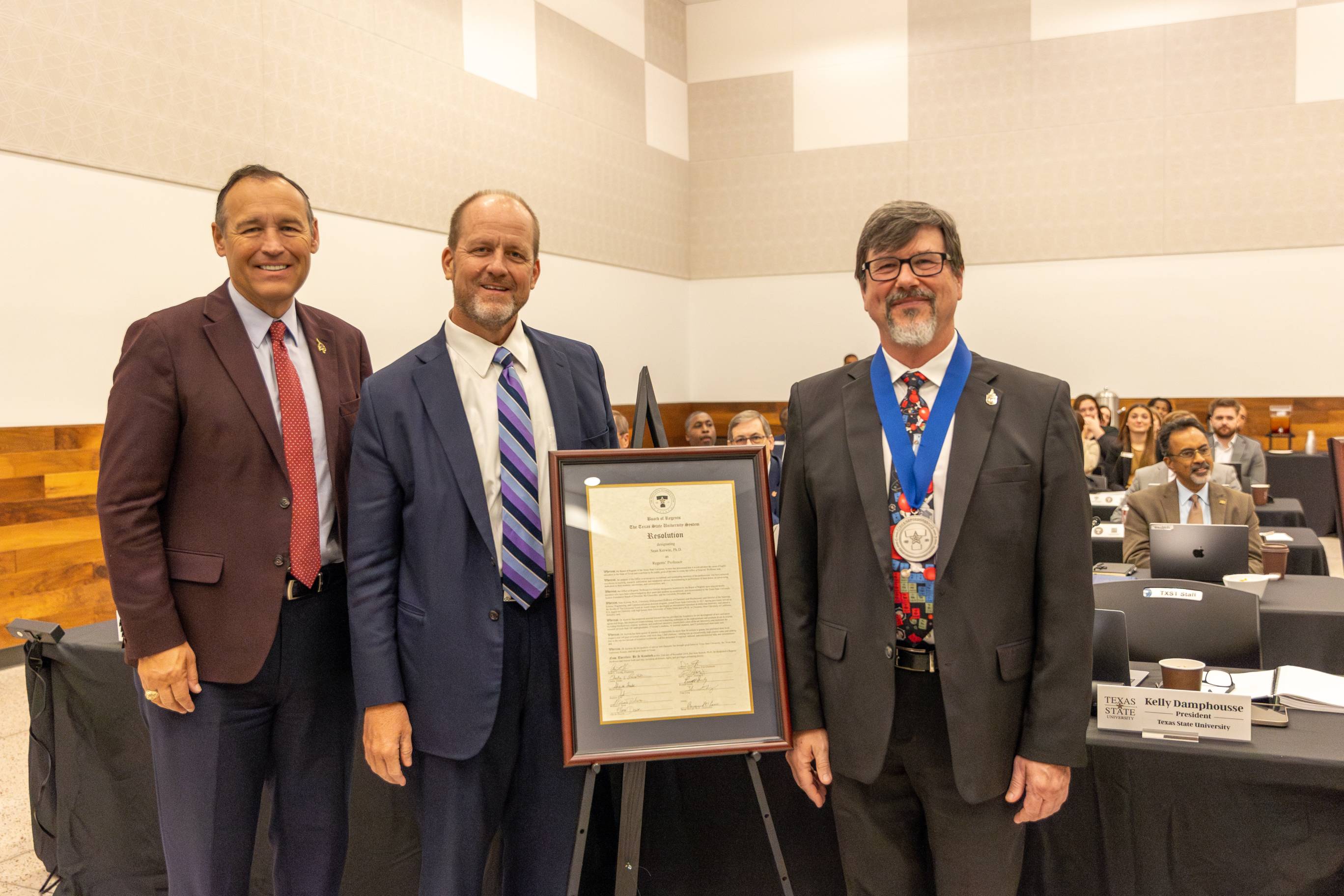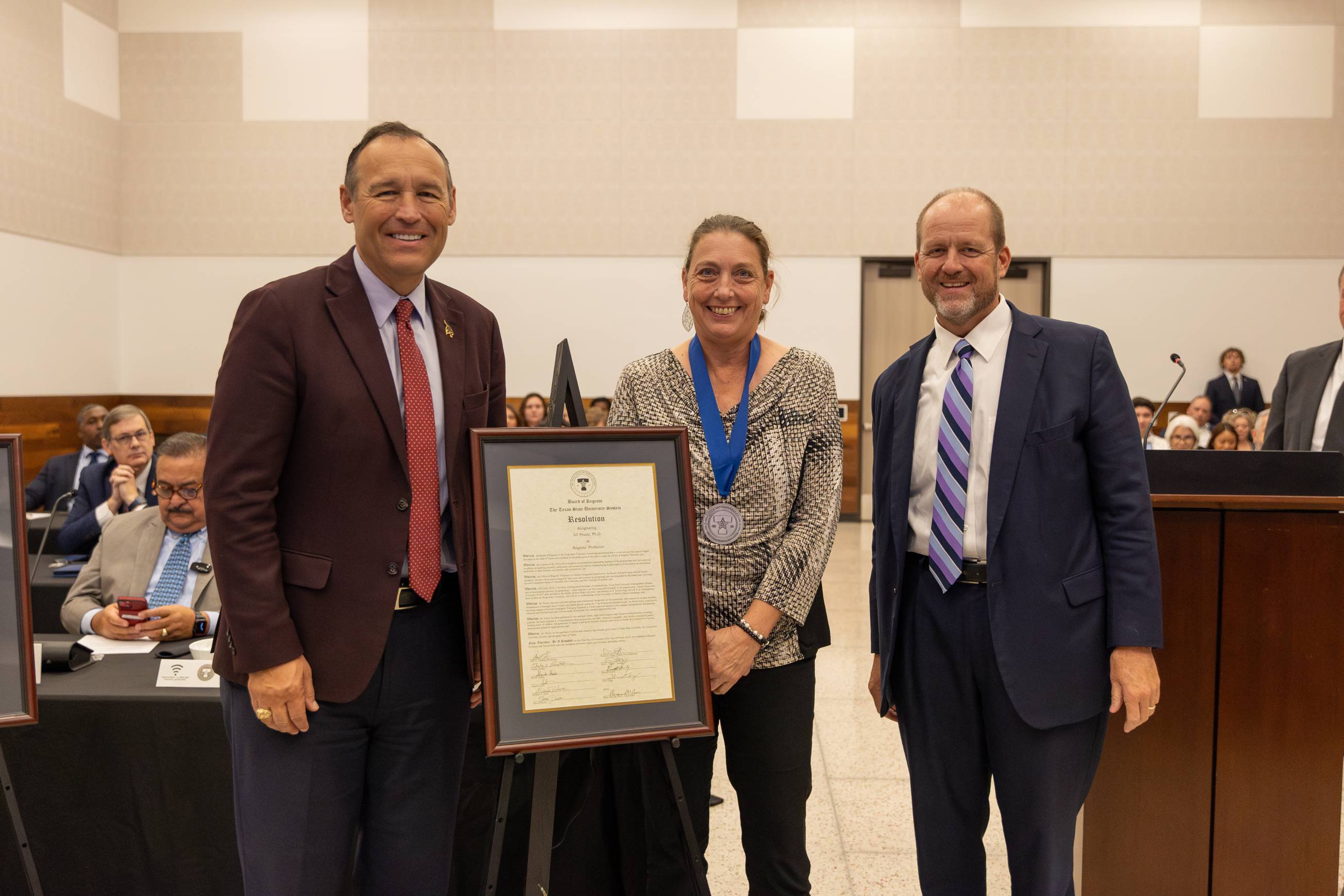Sean Kerwin, Ph.D., a professor in the Department of Chemistry and Biochemistry, and Jill Pruetz, Ph.D., a professor in the Department of Anthropology at Texas State University, have been named Regents’ Professors by the Texas State University System Board of Regents.
The board approved the honors during its quarterly meeting Nov. 22 in Beaumont.
The Regents’ Professor designation honors outstanding members of the system’s professoriate who have achieved excellence in teaching, research, publication and community service, while demonstrating an unwavering dedication to their students and university. Kerwin and Pruetz are the 25th and 26th TSUS Regents’ Professors to be honored at Texas State.
The Board of Regents bestows the designation upon tenured full professors who have been acknowledged as exceptional by their peers and students. The TSUS Foundation Board of Directors, the chancellor and the university president must all recommend the honor.
Sean Kerwin, Ph.D., Professor of Chemistry and Biochemistry

Kerwin came to Texas State in 2015 from the University of Texas at Austin. He earned his Ph.D. in chemistry from the University of California and his B.S. in chemistry with high honors from the University of Notre Dame.
Since his arrival at TXST, Kerwin has been named University Distinguished Professor of chemistry and biochemistry and appointed director of the interdisciplinary Materials Science, Engineering and Commercialization doctoral program. An extraordinary, impactful scientist, Kerwin has pioneered seminal research on non-canonical DNA-interactive agents as potential drugs, diradical and carbene-generating cyclization, and synthetic chemistry, medicinal chemistry and structure-based drug design—research that has provided the foundation for the development of new anticancer agents and drugs.
Kerwin has been issued 16 patents. He is responsible for more than $6 million in grants with an average of $291,000 per year since joining TXST and was the first at TXST to receive a Cancer Prevention and Research Institute of Texas (CPRIT) grant. He has published three book chapters and 144 peer-reviewed articles with more than 5,000 citations earning him an exceptionally high citation index. He has been recognized as a top 2% scientist world-wide since 2017 based on publication impact by Stanford University’s composite index. Since joining TXST, Kerwin has presented 33 invited regional, national and international talks and presentations. His impactful service to the profession extends to six high-profile national and international organizations where he has served as editor-in-chief of Natural Products Chemistry & Research, Reports in Organic Chemistry and Current Medicinal Chemistry—Anti-Cancer Agents.
Kerwin's award-winning, innovative teaching includes doctoral and professional to undergraduate courses from biochemistry to organic synthesis to medicinal chemistry and working alongside students in the world-class, state-of-the-art laboratory that he established. He has mentored the research of 127 undergraduates, 19 master’s students, 16 doctoral students and 23 postdoctoral associates, many of whom are now in tenure-track faculty positions or leaders in the chemical industry. Additionally, he has led the development of a proposed doctoral program in Integrated Molecular and Biophysical Chemistry.
Jill Pruetz, Ph.D., Professor of Anthropology

Pruetz came to TXST in 2017 from Iowa State University. She earned her Ph.D. in anthropology from the University of Illinois at Urbana-Champaign and her B.A. in anthropology from Texas State.
Since her arrival at TXST, Pruetz has been named University Distinguished Professor of anthropology. She is a TXST Distinguished Alumni and widely recognized as an international authority in primatology, often referred to as “the young Jane Goodall” by the popular press. Her exceptional record of productivity is exemplified through her contributions to research, teaching and service to professional and public audiences of all ages.
Pruetz has achieved both national and international recognition for her pioneering field research on savanna-dwelling chimpanzees in Senegal. One of her discoveries was ranked second among Wired News’ “Top 10 Scientific Breakthroughs,” which led to her being named a National Geographic Emerging Explorer.
Her transformational research has been published in two scholarly books, eight book chapters and 70 peer-reviewed articles in top-notch journals. As a public scholar her research has been featured in 13 documentary films produced by the BBC, National Geographic and Netflix. She also authored a children’s book, “How to Be a Primatologist,” for the National Geographic Kids Series. She has received 47 grants with funding totaling nearly $1 million, presented more than 100 invited presentations and is a consultant and expedition expert for National Geographic.
Pruetz’s teaching philosophy focuses on experiential learning to develop students’ critical thinking skills while exposing them to anthropological and primatological topics. She is a well-respected, exceptional instructor who engages students in her research as she teaches eight courses ranging from a 400-student undergraduate class to master’s and doctoral seminars. She has led more than a dozen study abroad and field research opportunities in Costa Rica, Nicaragua and Panama. She has graduated 35 master’s and seven doctoral students.
In addition to serving her academic department and college, Pruetz serves on boards and committees of several international nonprofit conservation organizations, one of which she established and continues to direct—the Neighbor Ape organization. She sits on committees for the International Union for the Conservation of Nature and is working to establish an endowment to provide access to scientific study for students of Senegal. Pruetz also serves on an editorial review board and as a reviewer for professional journals and funding organizations.